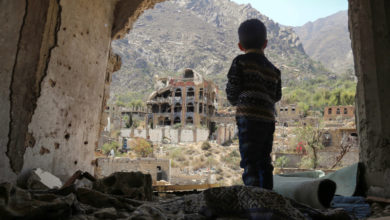UN: Afghan War Killed, Wounded More Than 10,000 Civilians in 2019

The United Nations reported Saturday the conflict in Afghanistan killed more than 3,400 civilians and injured nearly 7,000 others in 2019.
The U.N. Assistance Mission in Afghanistan (UNAMA) blamed the Taliban, Islamic State and other militant groups for causing 49% of the deaths, saying pro-government forces, including the U.S.-led coalition, were responsible for 43% deaths. The rest were caught in crossfire and other conflict-related incidents.
The report came as a seven-day mutually agreed reduced fighting truce went into effect Saturday to pave the way for the United States to sign a peace agreement with the Taliban on February 29, with the aim of ending the 18-year-old Afghan war, America’s longest.
UNAMA noted in its report the number of civilians killed or injured in conflict-related incidents in Afghanistan in the last 10 years alone surpassed a “grim milestone” of more than 100,000 casualties.
“Almost no civilian in Afghanistan has escaped being personally affected in some way by the ongoing violence,” said UNAMA chief Tadamichi Yamamoto.
“It is absolutely imperative for all parties to seize the moment to stop the fighting, as peace is long overdue; civilian lives must be protected and efforts for peace are underway,” he stressed.
The Taliban swiftly rejected the UNAMA report that the insurgent group was responsible for most of the casualties. It alleged in a statement that the U.N. mission in Afghanistan was running a campaign in support of American “occupation forces.”
The signing of the US-Taliban agreement this coming Saturday in Qatar will be witnessed by international dignitaries. It would set the stage for a gradual withdrawal of roughly 13,000 American troops from the country and open peace talks between Afghan parties to the conflict to agree on a permanent nationwide cease-fire and power-sharing in postwar Afghanistan.
US not looking to cut and run
The upcoming U.S.-Taliban agreement has raised concerns among Afghans that Washington could again abandon their country, just like it did after the withdrawal of Soviet occupation forces that led to a deadly civil war and brought the radical Taliban to power in the 1990s.
U.S. chief negotiator Zalmay Khalilzad, however, dismissed those concerns while speaking at an international conference on Afghan refugees in neighboring Pakistan earlier this week.
“We are not looking for cutting and running, as some say, because if that was the case I wouldn’t be working on a peace process, we would do just a (troop) withdrawal and we don’t need anyone’s permission to withdraw. We could do it unilaterally,” Khalilzad stressed.
The veteran Afghan-born U.S. diplomat insisted his team’s off-and-on protracted negotiations with Taliban interlocutors spread over the past 18 months were meant to leave behind “a good legacy” in Afghanistan.
“All this effort that we have made is to get a peace agreement, not to repeat the mistakes that we have made in the (19)90s,” Khalilzad said.
Khalilzad said there were a lot of challenges facing the Afghan peace process but he was “cautiously optimistic.”
“I believe that may be better than any time in the last couple of decades there is an opportunity,” he said.
Afghan political crisis
However, deepening Afghan political tensions following the outcome of the controversial presidential election earlier this poses an immediate challenge to the U.S. peace initiative.
The Afghan election commission has declared incumbent President Ashraf Ghani the winner of the election held nearly five months ago.
But runner-up incumbent Afghan Chief Executive Abdullah Abdullah rejected the results as manipulated in favor of Ghani and has threatened to establish his own government in Kabul. Abdullah has even issued decrees as head of his new governed, ordering replacement of several provincial governors.
The U.N. mission in Kabul warned Saturday it was “extremely concerned” at the ongoing events to replace government officials.
“Resorting to force or any other unlawful means at the very time that efforts are ongoing to realize a reduction in violence – with the expectation that it can lead to the start of an intra-Afghan negotiations on peace – jeopardizes the population’s hope for peace.”
The political rivalry raises questions about whether Afghan political forces would be able to form a united team to engage in much-sought negotiations with the Taliban to end hostilities in the country.
Source: Central Asia News





